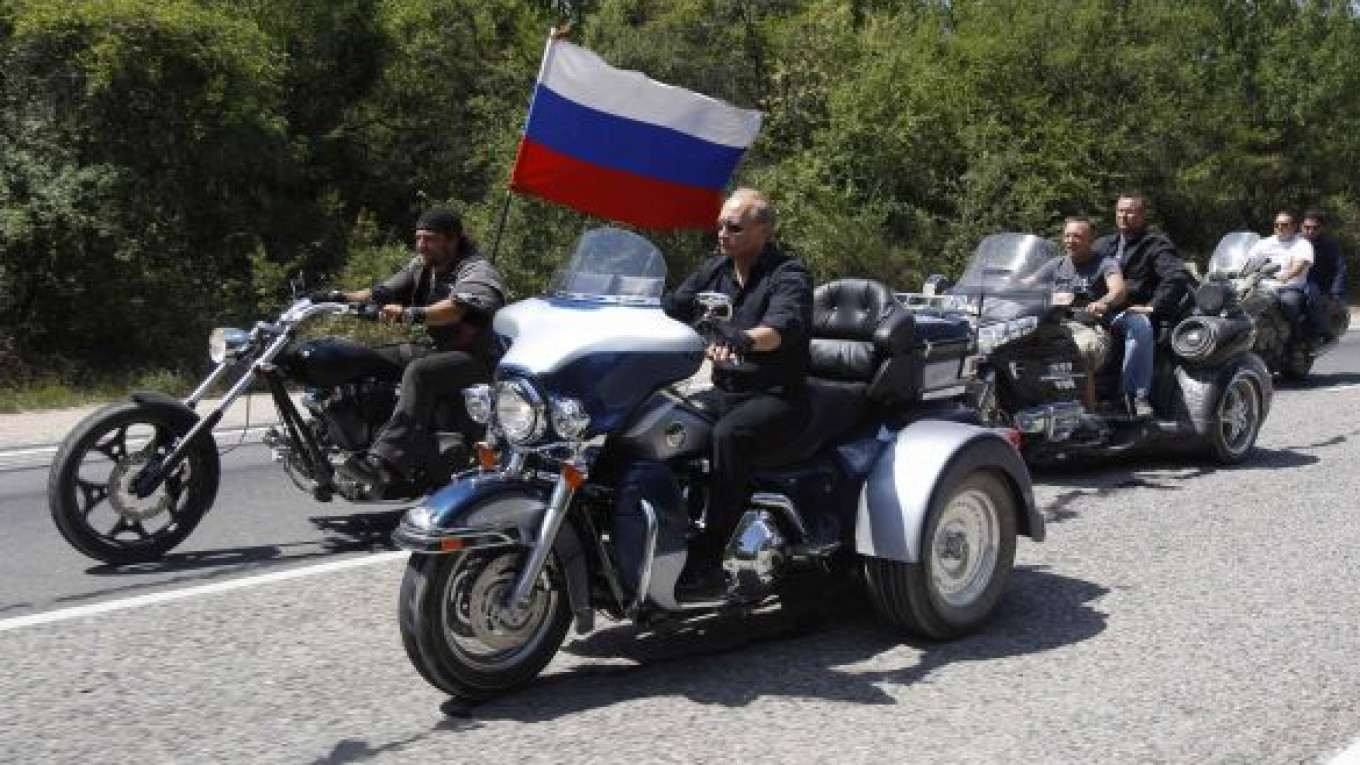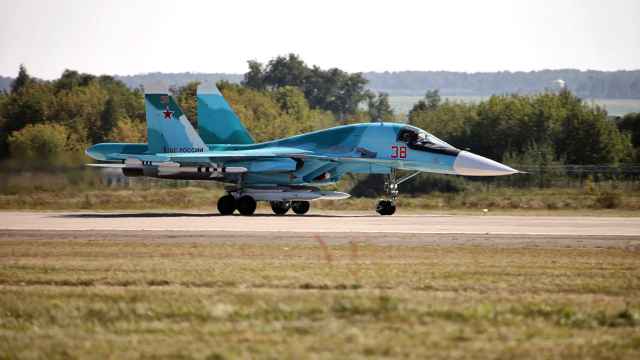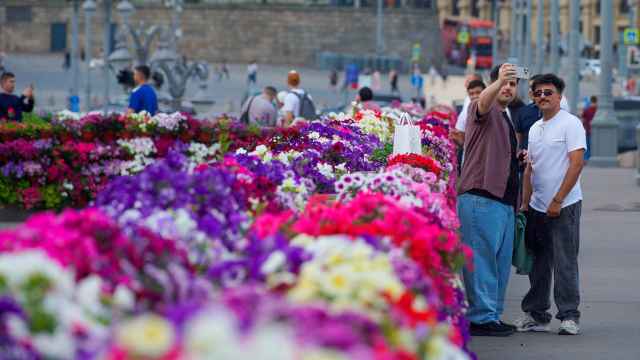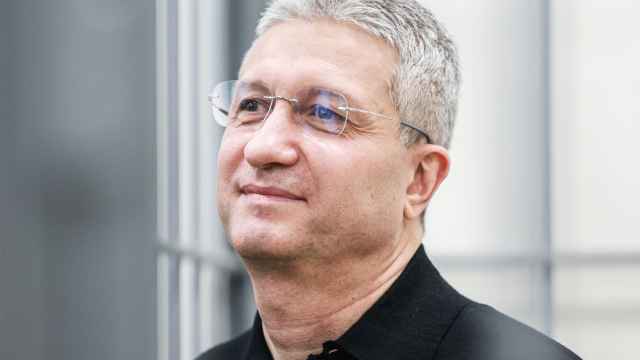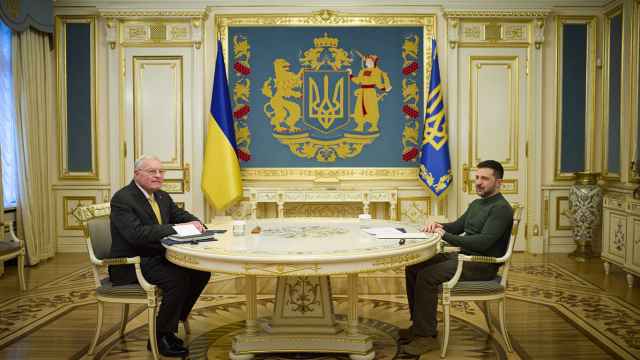Prime Minister Vladimir Putin said he has sung Soviet-era patriotic songs with the 10 spies deported from the United States and knows the identities of those who betrayed them.
Putin described his meeting with the spies during a trip to Ukraine, where he also rode a Harley-Davidson motorcycle and sought to bolster Russian-Ukrainian relations.
Putin did not say when or where he met with the 10 spies, who arrived in Moscow on July 9 and most recently were reportedly being debriefed at a Foreign Intelligence Service building in Moscow's outskirts.
"I met with them. We talked about life," Putin told reporters Saturday at the Crimean resort of Foros, according to a transcript published on the prime minister's web site.
"They will find decent work — I'm sure. I don't doubt that they will have interesting, bright lives," said Putin, who served as a KGB agent in East Germany in the 1980s and led the Federal Security Service in the late 1990s.
He said he had joined them in singing several songs, including "With What the Motherland Begins?" from the 1968 Soviet movie "The Shield and the Sword" about an undercover Russian spy in Nazi Germany.
"I'm not joking, seriously. And other songs with similar content," Putin said, adding that the songs were sung to live music, not karaoke.
The prime minister confirmed that Anna Chapman, the most well-known female spy from the group who married a British man and later divorced, also attended the meeting.
Putin said a betrayal had sparked the spy scandal and promised tough times for the traitors, whose names he said are known.
"Traitors always end badly. As a rule, they end up in the gutter as drunks or drug addicts,” he said.
When asked whether the state was planning to take revenge on the traitors, Putin said, "The special services live under their own laws, and everyone knows what these laws are."
U.S. officials have not said how they learned about the 10 spies, who pleaded guilty in a U.S. court to being agents for the Russian government while living as "illegals" — deep-cover spies who pose as ordinary people without the immunity offered by diplomatic passports. Many of the Russians adopted fake names and lived in suburban America for years, buying homes and raising families as they sought to glean information and make recruits in U.S. government policy-making circles.
They were deported to Russia in exchange for four Russians jailed on espionage-related charges.
The success of their work is unclear, with U.S. officials saying they did not learn any secrets and therefore were charged with illegally working for a foreign government rather than with espionage.
Putin declined to evaluate their work.
"As far as those people are concerned, I can tell you that it was a hard fate for each of them," he said. "First, they had to master a foreign language as their own. Think and speak it. And they had to fulfill tasks for the interests of their motherland for many, many years without being able to count on diplomatic immunity, putting themselves and their loved ones in danger."
The former academic adviser for one of the spies has suggested that her former student had not mastered English very well. Nina Khrushcheva, who advised the spy called Richard Murphy for three years at The New School in New York, said the student's Russian nature was surprisingly easy to spot.
"At first, I thought of him as a student like any other, but there was something odd about this man, with his strong Russian accent and his Irish-American name," Khrushcheva, the great-granddaughter of former Soviet leader Nikita Khrushchev, wrote in the Foreign Policy magazine.
Separately, Putin on Saturday donned dark sunglasses, black jeans and black fingerless gloves to ride a three-wheeled Harley-Davidson at an international bikers convention near Sevastopol.
He signed several dozen cards, one bike seat and one Czech bank note brought by a biker from Prague at the annual gathering, which drew 5,000 bikers from various countries, the government said in a statement.
Putin delivered a speech before the bikers, calling their means of transport "the most democratic."
"The bike is a symbol of freedom," he said.
In his speech, he offered congratulations on Russia's Navy Day, which fell on Sunday, and praised the friendship between Russia and Ukraine.
Answering journalists' questions later Saturday about his work as leader of the ruling United Russia party, Putin said he was always on the election trail.
"The campaign for the next election starts right after the last election ends," he said, adding that his preferred mode of campaigning was meeting with voters individually.
Putin also met with Ukrainian President Viktor Yanukovych.
Elsewhere in Crimea, Mayor Yury Luzhkov on Saturday visited Sevastopol in his second trip in a month to Ukraine after being banned in 2008 for urging Kiev to return Sevastopol to Russia.
Luzhkov told journalists that he had not changed his position on Sevastopol and thanked Yanukovych for lifting the ban. Luzhkov attended Yanukovych's 60th birthday celebrations earlier this month.
Luzhkov on Saturday signed a cooperation agreement with Sevastopol Mayor Valery Saratov and presented him with a blueprint of a school building and kindergarten as a gift.
"With this, construction costs can be reduced by up to 10 percent," said Luzhkov, whose billionaire wife, Yelena Baturina, owns the Inteko construction company, Interfax reported.
Luzhkov added that the gift was worth $3 million.
It wasn't clear whether Sevastopol's mayor gave anything back to Luzhkov.
Meanwhile, Russian Orthodox Patriarch Kirill also paid a visit to Ukraine over the weekend, traveling to Dnipropetrovsk, Ukraine's third-largest city, to conduct an open-air church service for about 3,000 people.
He called on the Russian and Ukrainian Orthodox churches to lay aside political ambitions to unite as a single Orthodox nation, according to a transcript of Saturday's speech.
On Sunday, Kirill arrived in Kiev, where all demonstrations either for or against the patriarch had been banned. He is to stay there until Wednesday.
A Message from The Moscow Times:
Dear readers,
We are facing unprecedented challenges. Russia's Prosecutor General's Office has designated The Moscow Times as an "undesirable" organization, criminalizing our work and putting our staff at risk of prosecution. This follows our earlier unjust labeling as a "foreign agent."
These actions are direct attempts to silence independent journalism in Russia. The authorities claim our work "discredits the decisions of the Russian leadership." We see things differently: we strive to provide accurate, unbiased reporting on Russia.
We, the journalists of The Moscow Times, refuse to be silenced. But to continue our work, we need your help.
Your support, no matter how small, makes a world of difference. If you can, please support us monthly starting from just $2. It's quick to set up, and every contribution makes a significant impact.
By supporting The Moscow Times, you're defending open, independent journalism in the face of repression. Thank you for standing with us.
Remind me later.


